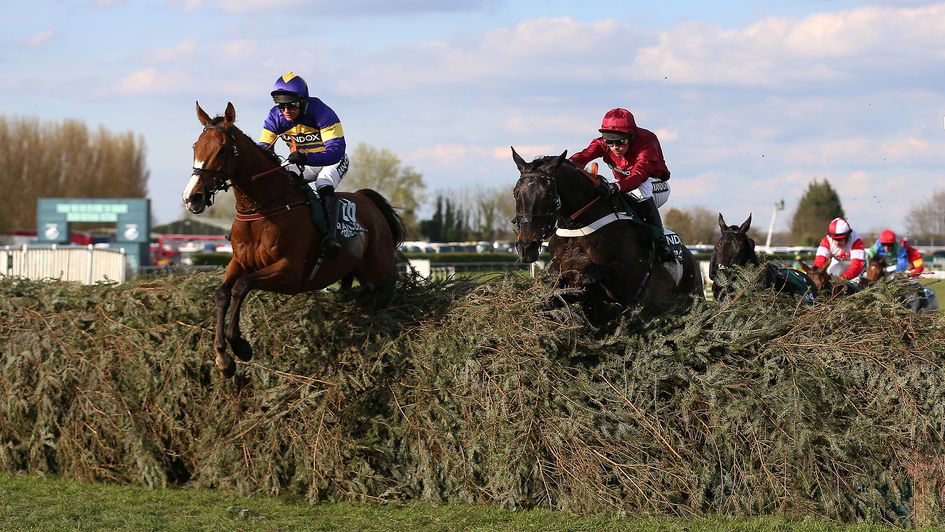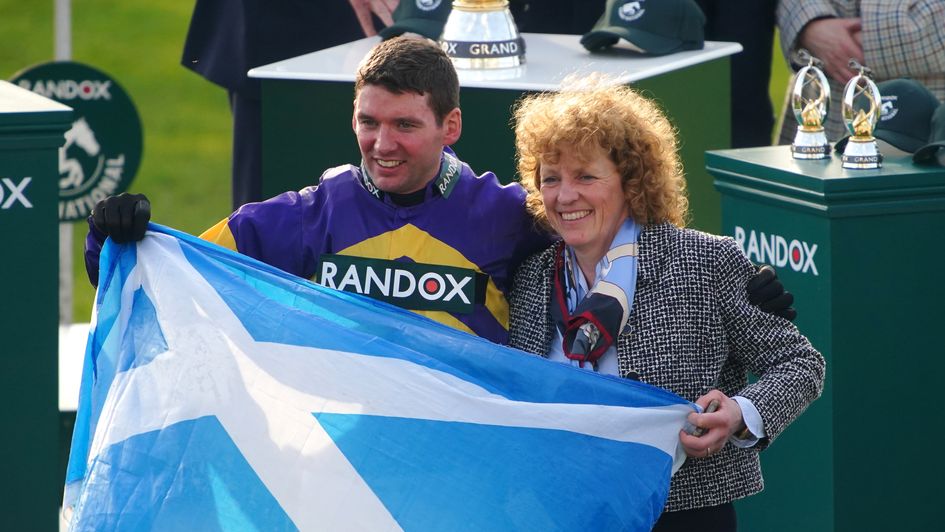Our man reflects on an extraordinary Grand National day where emotions ran hot at Aintree for several reasons.
Forget Making Plans for Nigel – Racing must be agile
Coming up to 4.30pm on a sunny spring Saturday at Aintree and the area behind the main stand is abuzz.
Lads in tight suits and lasses in tighter dresses gab away merrily and, as Simon Holt calls Midnight River home to seal a Dan Skelton double, a small, wrinkly figure clad in custard cords and brown trilby pulled down to his eyebrows strides briskly towards the paddock.
And, just like that, the arrival of arch rabble rouser Nigel Farage and his edgy handlers provides a sharp reminder that the Grand National has become a key battle in an ongoing culture war that will shape the way Britain looks and feels in the post-Covid era.
Wind the clock forward an hour and battle rages on and off the track.
Waves of security staff and ‘bizzies’ with ferocious dogs straining at the leash clash with protestors. One of only two Scottish-trained horses in the race meets his end at the first fence as the other glides to glory. And the ‘here we go again’ feeling that wakes you up to start scribbling at 4.30am is tinged with an added sense that things are changing.
It was palpable in the Media Centre on Saturday, where seasoned scribes long used to nosing on the triumph of National winners were advised in no uncertain terms by hard nosed news desks that death and disruption also need to lead the parade nowadays.
It was there in ITV's highly professional but also highly charged television coverage, which combined a hearty disdain for the way that Animal Rising protestors went about their business with a missionary zeal for the purity of the sport in a way that was passionate yet also a little disturbing.
And, with Covid and Boris finally fading from the public consciousness, the role of the National in modern Britain will be high on the agenda again for many a columnist and phone-in show over the next few days.
Debate over the National is almost as old as the race itself and the Guardian’s Sean Ingle recalled a parliamentary discussion way back in 1954 in which Conservative MP HS Johnson argued that “this type of race in its present form cannot in all public decency be tolerated any longer."
Facts cannot be denied
True, the National has changed appreciably since then but public sensibilities have shifted to an even greater degree and, in a world where nuance and shades of grey seldom count for much, the thought of what comes next is something that must be addressed.
The fact that ‘Central Casting racegoer from the 50s’ Farage wasn’t wheeled out to say “you’ll be stopping us having a bacon sandwich next" came as a relief but Labour made whip review a point of their last manifesto and it’s hardly a stretch to think the National could figure in their next one if focus group data suggests it might be a vote winner.
Ingle signed off his excellent National review by highlighting Lucinda Russell’s articulate defence of the way racehorses are cared for while wondering how her words resonated on a day when “battle lines were sharply drawn and, you sense, few minds were changed."
And yet, over time, minds can and do change. Perhaps it's not just the Aintree fences that have got softer over time, but I suspect I’m far from alone in admitting my relationship with the race has evolved over the years.
Don’t get me wrong, I still adore the occasion and support the changes made to modernise and sanitise it. However, the facts are the facts. Put simply, we had six consecutive fatality-free Nationals once the fences were altered in 2013.
That seemed a large enough sample to suggest the race was entering a brave new world but Hill Sixteen’s death was the fifth in the last four renewals - and how can you watch close-up coverage in all its terrifying glory and not realise this unique contest presents a level of risk to participants that an increasing number of people find hard to accept?
What happens next?
Further changes will doubtless be suggested, though I’m not sure that is the route to go down, but powerful words and images are the weapons both sides will use as the battle for the future of the Grand National continues.
Dismissing protestors as attention seekers who know nothing about racehorses and the way they are looked after is understandable – probably accurate in some cases – but the muscular McCoy method will only truly resonate with constituents whose minds are already made up.
But the floating voters, and there are millions of them in any election, will only be seduced by those who employ more subtle methods of persuasion.
It might be Lucinda or Skelton talking in measured, skilful, considered tones about how racing people and those who display respect for animals in a far different way have a fair bit more that unites them than divides them.
It might be skilled advocates like Kevin Blake dismantling a hapless disruptor on a Talk TV piece that has had over 1.3m Twitter views, or maybe a movement like Stand Up For Racing can cut through to deliver a message that the BHA have failed to do with the requisite polish and impact.
But, make no mistake, Britain’s most famous race is back in a battle now. And, as Blakey knows better than most, when the bell goes you need to use all the skills and agility at your disposal if you want to survive.
More Grand National reaction
Safer gambling
We are committed in our support of safer gambling. Recommended bets are advised to over-18s and we strongly encourage readers to wager only what they can afford to lose.
If you are concerned about your gambling, please call the National Gambling Helpline / GamCare on 0808 8020 133.
Further support and information can be found at begambleaware.org and gamblingtherapy.org








